四级英语作文grain crisis
面临粮食危机英文作文
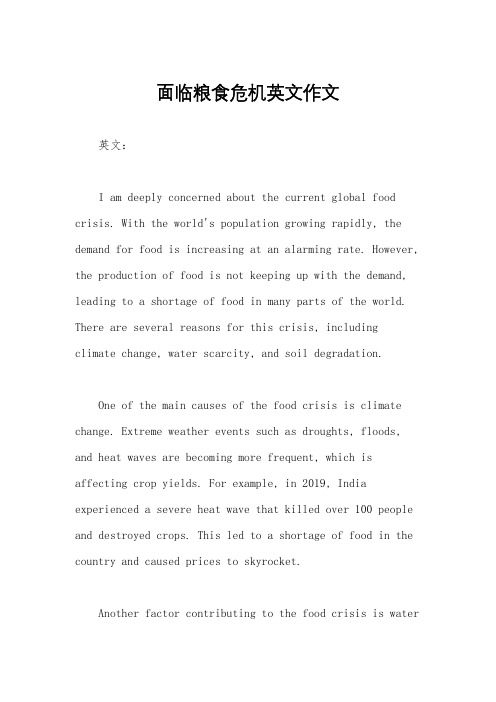
面临粮食危机英文作文英文:I am deeply concerned about the current global food crisis. With the world's population growing rapidly, the demand for food is increasing at an alarming rate. However, the production of food is not keeping up with the demand, leading to a shortage of food in many parts of the world. There are several reasons for this crisis, including climate change, water scarcity, and soil degradation.One of the main causes of the food crisis is climate change. Extreme weather events such as droughts, floods, and heat waves are becoming more frequent, which is affecting crop yields. For example, in 2019, India experienced a severe heat wave that killed over 100 people and destroyed crops. This led to a shortage of food in the country and caused prices to skyrocket.Another factor contributing to the food crisis is waterscarcity. As the world's population grows, the demand for water is also increasing. However, many countries arefacing water shortages due to overuse and climate change. This is affecting agricultural production, as crops require water to grow. For example, in California, a severe drought in 2014 caused a significant drop in crop yields, leadingto higher food prices.Soil degradation is also a significant factor in the food crisis. Soil erosion, nutrient depletion, andpollution are all affecting crop yields and reducing the amount of arable land available for farming. For example,in China, soil pollution has led to a decline inagricultural production and has caused food safety concerns.In conclusion, the global food crisis is a complexissue that requires urgent attention. Climate change, water scarcity, and soil degradation are all contributing to the problem, and we need to take action to address these issues. This may involve investing in sustainable agriculture, improving water management, and reducing greenhouse gas emissions.中文:我非常关注当前全球粮食危机。
英语专业四级考试之写作范文:危机Crisis

英语专业四级考试之写作范文:危机CrisisCrisis is to our life what illness is to our body. Just as fatal disease can destroy our body and sometimes even put an end to our lives, so does smashing crisis knock us down so hopelessly that we might never have chance of standing up again. However, most crises that frequent us in life are not such category. They, like occasional ailments which sometimes can bolster our body's immune system, are mostly minor and surmountable and therefore making us hardy enough to survive whatever adversities in our later life. Even those serious crises, if handled properly, can be turned to a blessing to us, too.As far as a nation is concerned, crisis can be rendered beneficial. Take Wenchuan earthquake which shook most of Sichuan recently for example. The crisis has cost us Chinese a lot. Houses collapsed, bridges broke down and many affected areas were cut off from the outside world. Nearly a million people lost their homes, ten thousands of people were injured and another ten thousands of people were killed. But our sufferings won't go in vain. Scientists are more determined to improve the means by which we forecast earthquakes withmore accuracy. We should build houses which can survive the destructive earthquakes. And we also should better the mechanism to face the emergencies and crisis.As for economic life, crises are not always rendered bad. During these times, we can stop the race of fast economy to speculate about some fundamental issues of humanity such as how much high-speed development in this way can contribute to the well-being of human life. Just take my own country for instance. Of course, in the past two decades or so, our economy has gained the highest speed man has experienced. But haven't we paid too much? Our rivers are polluted. Our natural resources are shrinking. Our national power of creation is drained. Is it worthy of it? Isn't it high time we gave it a serious thought? Shouldn't we stop making ourselves long in quantity and short in quality? And chance of deep thought has come with this crisis, which is now deepening in most parts of the world.Crisis sometimes contributes to our life treasure in a way that few can imagine. It can weather us and make us strong enough to face ourselves when we feel weak. Eric, my uncle is a case in point. He had hard time in his childhood going through such a fatal disease that he had never thought hecould survive. He was in due course saved by doctors. Ever since then he regarded his life as a second given by God and has been so grateful to the world that he has been doing whatever he can to give back in the same measure to other fellows. And now he is living a happy and successful life.As a well-known ancient Chinese notion goes, the past lessons if not forgotten can be good teachers for us all. If we can bear in mind the various sufferings and ordeals we have experienced, then our sufferings will not go unrewarded and those of our compatriots who was killed in the earthquake did not die in vain. We should take the lessons from crisis and regard them as a chance for new growth.。
粮食危机英文演讲稿三分钟
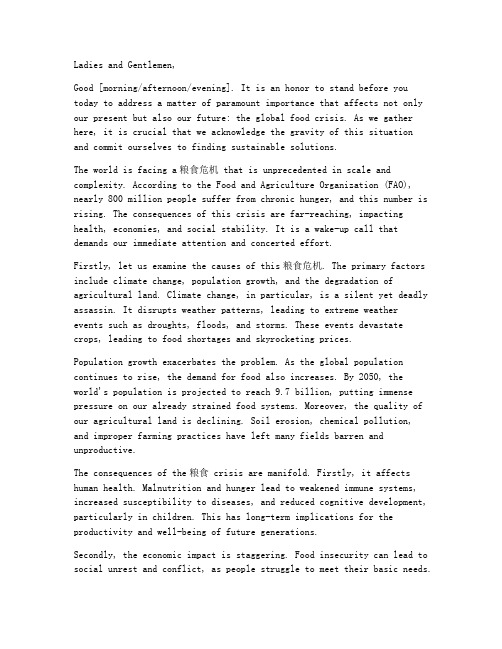
Ladies and Gentlemen,Good [morning/afternoon/evening]. It is an honor to stand before you today to address a matter of paramount importance that affects not only our present but also our future: the global food crisis. As we gather here, it is crucial that we acknowledge the gravity of this situationand commit ourselves to finding sustainable solutions.The world is facing a粮食危机 that is unprecedented in scale and complexity. According to the Food and Agriculture Organization (FAO), nearly 800 million people suffer from chronic hunger, and this number is rising. The consequences of this crisis are far-reaching, impacting health, economies, and social stability. It is a wake-up call that demands our immediate attention and concerted effort.Firstly, let us examine the causes of this粮食危机. The primary factors include climate change, population growth, and the degradation of agricultural land. Climate change, in particular, is a silent yet deadly assassin. It disrupts weather patterns, leading to extreme weatherevents such as droughts, floods, and storms. These events devastate crops, leading to food shortages and skyrocketing prices.Population growth exacerbates the problem. As the global population continues to rise, the demand for food also increases. By 2050, theworld's population is projected to reach 9.7 billion, putting immense pressure on our already strained food systems. Moreover, the quality of our agricultural land is declining. Soil erosion, chemical pollution,and improper farming practices have left many fields barren and unproductive.The consequences of the粮食 crisis are manifold. Firstly, it affects human health. Malnutrition and hunger lead to weakened immune systems, increased susceptibility to diseases, and reduced cognitive development, particularly in children. This has long-term implications for the productivity and well-being of future generations.Secondly, the economic impact is staggering. Food insecurity can lead to social unrest and conflict, as people struggle to meet their basic needs.It also hampers economic growth, as food prices rise and the cost of living increases. The poor are disproportionately affected, as they spend a larger proportion of their income on food.Furthermore, the粮食 crisis poses a threat to biodiversity. As we prioritize the production of high-yield crops, we risk losing valuable genetic diversity, which is essential for adapting to climate change and ensuring food security in the long term.In light of these challenges, what can we do to address the粮食危机? The solution lies in a multifaceted approach that encompasses policy, technology, and individual action.Firstly, governments must prioritize sustainable agricultural practices. This includes investing in research and development of climate-resilient crops, promoting organic farming, and implementing policies that protect the environment and promote biodiversity. It also involves improving access to credit and technology for smallholder farmers, who are often the most vulnerable to the crisis.Secondly, technological innovation plays a crucial role. Advances in biotechnology, precision agriculture, and water management can significantly increase crop yields and reduce waste. By harnessing these technologies, we can ensure that our food systems are more efficient and resilient.Thirdly, individual action is essential. We must all become more conscious consumers, making informed choices about the food we buy and how we dispose of it. Reducing food waste, supporting local farmers, and advocating for sustainable practices are simple yet powerful steps we can take to make a difference.Lastly, we must foster global cooperation. The粮食 crisis is a global problem that requires a global solution. International organizations, governments, and non-governmental organizations must work together to share resources, knowledge, and expertise. This includes supporting initiatives aimed at improving food security in developing countries and addressing the root causes of the crisis.In conclusion, the粮食 crisis is a solemn reminder of the interconnectedness of our world. It demands our urgent attention and collective action. By prioritizing sustainable agriculture, embracing technological innovation, taking individual responsibility, and fostering global cooperation, we can overcome this challenge and ensure a secure and abundant food supply for all.Thank you for your attention. Together, we can turn the tide against the 粮食危机 and build a brighter future for generations to come.[End of speech]。
保护粮食英文作文大学
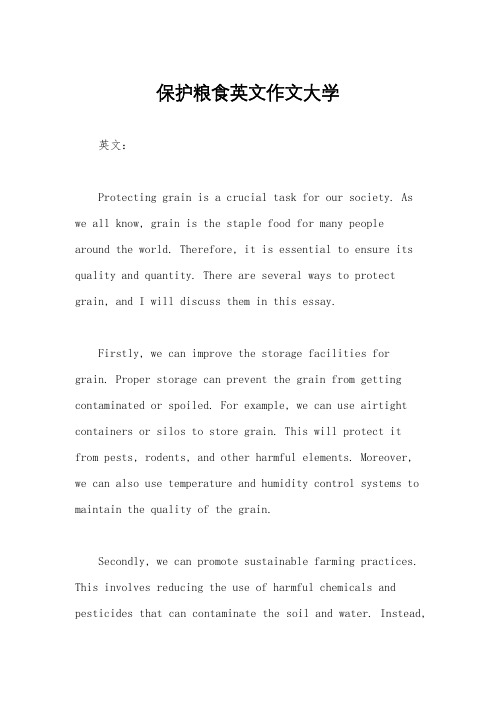
保护粮食英文作文大学英文:Protecting grain is a crucial task for our society. As we all know, grain is the staple food for many peoplearound the world. Therefore, it is essential to ensure its quality and quantity. There are several ways to protect grain, and I will discuss them in this essay.Firstly, we can improve the storage facilities for grain. Proper storage can prevent the grain from getting contaminated or spoiled. For example, we can use airtight containers or silos to store grain. This will protect it from pests, rodents, and other harmful elements. Moreover, we can also use temperature and humidity control systems to maintain the quality of the grain.Secondly, we can promote sustainable farming practices. This involves reducing the use of harmful chemicals and pesticides that can contaminate the soil and water. Instead,we can use organic farming methods that promote the natural growth of crops. This will not only protect the grain but also the environment.Thirdly, we can increase public awareness about the importance of protecting grain. This can be done through education campaigns and outreach programs. People need to understand the value of grain and the consequences of wasting it. By creating a sense of responsibility and accountability, we can encourage people to take action to protect grain.In conclusion, protecting grain is a crucial task that requires the collective effort of society. By improving storage facilities, promoting sustainable farming practices, and increasing public awareness, we can ensure the quality and quantity of grain for generations to come.中文:保护粮食是我们社会的一项重要任务。
四级英语作文谷物
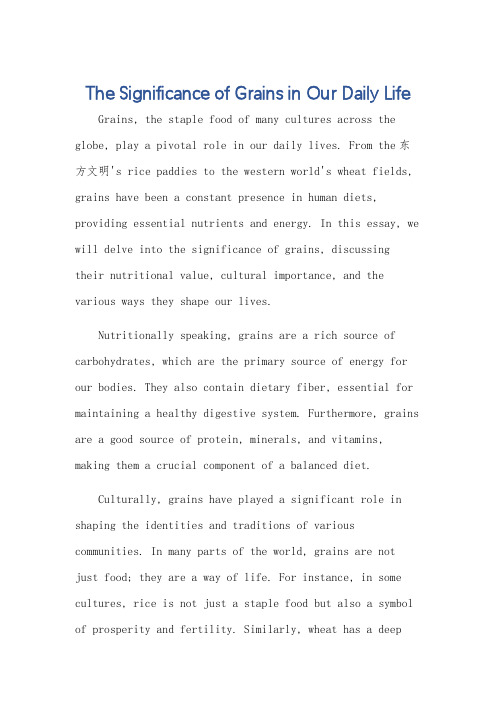
The Significance of Grains in Our Daily Life Grains, the staple food of many cultures across the globe, play a pivotal role in our daily lives. From the东方文明's rice paddies to the western world's wheat fields, grains have been a constant presence in human diets, providing essential nutrients and energy. In this essay, we will delve into the significance of grains, discussingtheir nutritional value, cultural importance, and the various ways they shape our lives.Nutritionally speaking, grains are a rich source of carbohydrates, which are the primary source of energy for our bodies. They also contain dietary fiber, essential for maintaining a healthy digestive system. Furthermore, grains are a good source of protein, minerals, and vitamins, making them a crucial component of a balanced diet.Culturally, grains have played a significant role in shaping the identities and traditions of various communities. In many parts of the world, grains are notjust food; they are a way of life. For instance, in some cultures, rice is not just a staple food but also a symbol of prosperity and fertility. Similarly, wheat has a deepcultural significance in western countries, with the wheat sheaf often used as a symbol of harvest and plenty.Moreover, grains have also played a crucial role in the economic development of many regions. The agricultural industry, particularly grain production, has been a major contributor to the economies of many countries. The tradeof grains has also fostered cultural exchange and understanding between different parts of the world.In conclusion, grains are not just a source of nourishment; they are a vital part of our cultural heritage, economic well-being, and social fabric. As we move forward, it is important to recognize the significance of grains in our lives and to ensure their sustainable production and consumption, preserving not just our health but also our cultural and environmental heritage.**谷物在日常生活中的重要性**谷物,作为全球许多文化的主食,在我们的日常生活中扮演着至关重要的角色。
全国粮食危机英文作文
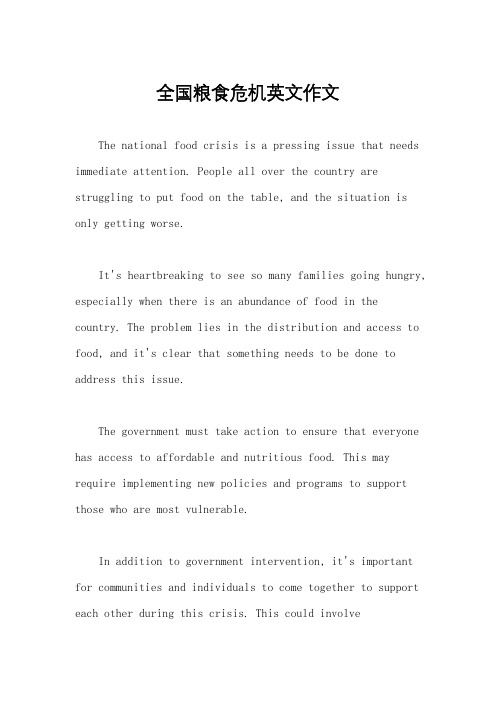
全国粮食危机英文作文The national food crisis is a pressing issue that needs immediate attention. People all over the country are struggling to put food on the table, and the situation is only getting worse.It's heartbreaking to see so many families going hungry, especially when there is an abundance of food in the country. The problem lies in the distribution and access to food, and it's clear that something needs to be done to address this issue.The government must take action to ensure that everyone has access to affordable and nutritious food. This may require implementing new policies and programs to support those who are most vulnerable.In addition to government intervention, it's important for communities and individuals to come together to support each other during this crisis. This could involveorganizing food drives, community gardens, and other initiatives to help alleviate the food shortage.It's crucial for everyone to recognize the severity of the situation and to take proactive steps to address it. Whether it's through volunteering, donating, or advocating for change, every little bit helps in the fight against the national food crisis.Ultimately, it's going to take a collective effort from all sectors of society to overcome this crisis. It's timefor us to come together and work towards a solution that ensures everyone has access to the food they need to thrive.。
粮食危机英语作文120
粮食危机英语作文Food crisisWorld food crisis urbanization biofuels Hello everyone, on behalf of our group, I would like to introduce to you our research project world food crisis as you know, food shortage has attacked many countries in the world, and even caused social unrest in some areas (a possible version). Hello everyone, now I'd like to tell you something about us representing me Our group's research project "world food crisis", as you know, food shortage has affected many countries in the world, and even caused social unrest in some areas. But who is the first to be responsible for the current world food crisis? Because of climate change, the world's annual grain production has declined, the rapid development of industry and urbanization has led to a large number of farmland loss, facing energy prices On the one hand, we should pay attention to environmental protection and improve the ecological environment.On the other hand, we should take strict measures to protect cultivated land. In order to build a harmonious world, the developed countries should take their responsibility to help. For me, I will call on you People around us live frugally.I think we should work hard to learn development science tohelp solve the food shortage in the future.。
the grain crisis英语作文
The grain crisis is a critical issue that affects the global community,particularly in regions where agriculture is the backbone of the economy.This essay will explore the causes of the grain crisis,its impacts,and potential solutions to address this pressing concern.Causes of the Grain Crisis1.Climate Change:One of the primary reasons for the grain crisis is the adverse effects of climate change.Unpredictable weather patterns,including extreme droughts and floods,have significantly impacted crop yields.nd Degradation:Intensive farming practices have led to soil erosion and degradation, reducing the fertility of the land and its ability to support grain production.3.Water Scarcity:The availability of fresh water is essential for agriculture.In many regions,water scarcity is becoming a serious problem due to overextraction,pollution, and climate change.4.Population Growth:The increasing global population has led to a higher demand for food,putting additional pressure on grain production.5.Mismanagement and Corruption:In some countries,poor governance and corruption have led to the inefficient allocation of resources and funds meant for agricultural development.6.Dependence on Fossil Fuels:Modern agriculture is heavily reliant on fossil fuels for machinery and fertilizers,which contributes to environmental degradation and is unsustainable in the long term.Impacts of the Grain Crisis1.Food Insecurity:The most direct impact of the grain crisis is food insecurity,leading to malnutrition and hunger,particularly among the most vulnerable populations.2.Economic Instability:Grain is a staple food for many,and its scarcity can lead to price spikes,affecting the economy and causing social unrest.3.Migration:In regions severely affected by the grain crisis,people may be forced to migrate in search of food and better living conditions,leading to social and political challenges.4.Environmental Degradation:The pursuit of increased grain production can lead to further deforestation and environmental harm,creating a vicious cycle of ecological decline.5.Health Issues:A lack of access to a balanced diet due to grain scarcity can result in a range of health issues,including stunted growth in children and increased susceptibility to diseases.Potential Solutions1.Sustainable Farming Practices:Promoting sustainable farming methods,such as crop rotation,organic farming,and agroforestry,can help maintain soil health and increase resilience to climate change.2.Investment in Agricultural Technology:Developing and implementing advanced farming technologies can improve efficiency and reduce the reliance on fossil fuels.3.Water Management:Effective water management strategies,including rainwater harvesting and efficient irrigation systems,can help conserve water resources for agriculture.4.Policy Reforms:Governments should enact policies that support sustainable agriculture,combat corruption,and ensure fair distribution of resources.cation and Training:Educating farmers about sustainable practices and providing them with the necessary training can help improve agricultural productivity and sustainability.6.International Cooperation:Global cooperation is essential to share knowledge, technology,and resources to address the grain crisis effectively.In conclusion,the grain crisis is a multifaceted problem that requires a comprehensive approach involving sustainable practices,technological innovation,and international collaboration.By addressing the root causes and implementing effective solutions,we can work towards ensuring food security and environmental sustainability for future generations.。
粮食危机 英文作文
粮食危机英文作文Food crisis is a serious issue that affects millions of people around the world. The lack of access to affordable and nutritious food is a major problem in many countries, leading to malnutrition and hunger.In some regions, climate change has caused droughts and floods, destroying crops and making it difficult forfarmers to grow food. This has led to food shortages and higher prices, making it even harder for people to afford the food they need.Conflict and political instability also contribute to food crises. In war-torn countries, food distribution is often disrupted, leaving many people without access to food. In addition, economic sanctions and trade restrictions can further exacerbate the problem, making it difficult for countries to import the food they need.The COVID-19 pandemic has also had a significant impacton food security. Lockdowns and travel restrictions have disrupted food supply chains, leading to shortages and price increases. Many people have lost their jobs or sources of income, making it even harder for them to afford food.It is important for the international community to come together to address the root causes of food crises. This includes investing in sustainable agriculture, supporting smallholder farmers, and addressing the impacts of climate change. It also requires addressing the underlying issues of conflict, political instability, and economic inequality that contribute to food insecurity.It is crucial for governments, non-governmental organizations, and the private sector to work together to ensure that everyone has access to affordable andnutritious food. This requires not only short-term emergency aid, but also long-term solutions that address the structural causes of food crises. Only by working together can we hope to end the cycle of food insecurity and ensure that everyone has enough to eat.。
粮食危机英文z作文
粮食危机英文z作文The world is facing a food crisis. Prices are soaring, and many people cannot afford to buy the food they need to survive. This crisis is not just a problem for developing countries, but also for developed nations. It is a global issue that needs urgent attention.The reasons for the food crisis are complex. Climate change is causing extreme weather events, such as droughts and floods, which are destroying crops and reducing food production. In addition, the demand for food is increasing due to population growth and changing diets. As a result, there is not enough food to go around, and prices are rising.The consequences of the food crisis are devastating. Millions of people are going hungry, and malnutrition is on the rise. Children are particularly vulnerable, as malnutrition can have long-term effects on their physical and cognitive development. In addition, the food crisis isfueling social and political unrest in many parts of the world.Addressing the food crisis requires a multi-faceted approach. It is essential to invest in sustainable agriculture and support small-scale farmers, who are often the most affected by the crisis. In addition, there needs to be greater international cooperation to ensure that food is distributed equitably and that vulnerable populations are supported.Ultimately, the food crisis is a symptom of larger issues, such as inequality and unsustainable consumption. It is clear that addressing the food crisis requires not just short-term solutions, but also long-term changes to the way we produce and consume food. It is a complex problem, but one that must be addressed if we are to build a more equitable and sustainable world.。
- 1、下载文档前请自行甄别文档内容的完整性,平台不提供额外的编辑、内容补充、找答案等附加服务。
- 2、"仅部分预览"的文档,不可在线预览部分如存在完整性等问题,可反馈申请退款(可完整预览的文档不适用该条件!)。
- 3、如文档侵犯您的权益,请联系客服反馈,我们会尽快为您处理(人工客服工作时间:9:00-18:30)。
Over the past couple of years, several cases of the grain crisis have been disclosed on various media, ranging from newspaper to the Internet. Indeed, the problem of grain shortage has become a hot button across the society. The trend of grain crisis
has become increasingly serious, which the government could not afford to turn a blind eye to.
There are a couple of driving forces, I would argue, behind this undesirable tide. First, the price of petroleum is rising and break through its history which improve cost of agricultural industry. Secondly, it is bad weather that give rise to reduction of rice output. More improtantly, because the price of petroleum has never declined, a world of corn are used to produce biofuel.
As confucius instructed, it is better later than never. Prompt and strict measures should be taken to turn back this trend. The government should draw up tougher laws to stop producing biofuel and launch a massive moral campaign to educate all citizens to learn how to reduce the waste. Iam firmly convinced that through our combined efforts we are bound to solve the grain crisis.。
